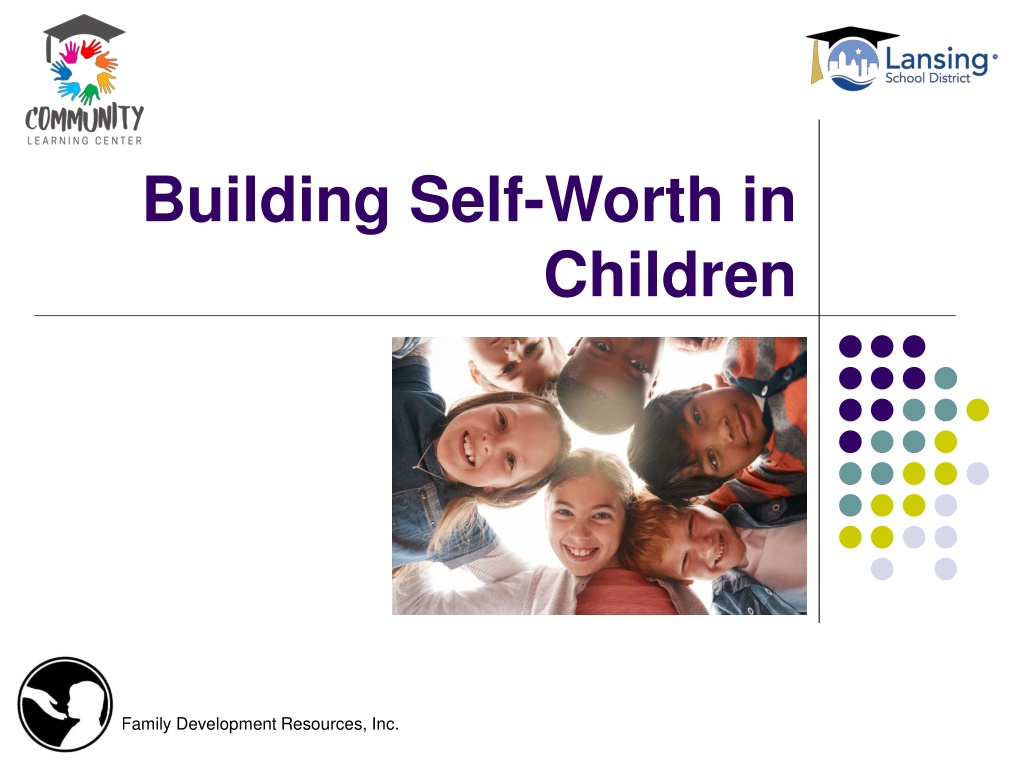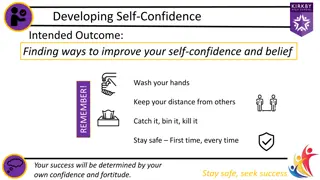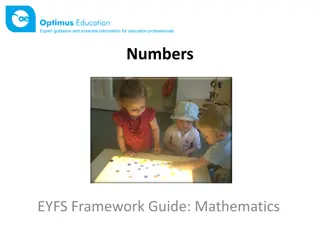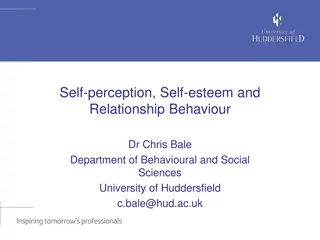Understanding Self-Worth in Children: Building a Strong Foundation
Explore the importance of self-concept, self-esteem, and self-worth in children's development. Learn how parents can positively impact a child's self-perception and self-value through nurturing experiences. Discover the key sources influencing children's self-worth and the critical role of early life experiences in shaping their overall sense of worth and identity.
Download Presentation

Please find below an Image/Link to download the presentation.
The content on the website is provided AS IS for your information and personal use only. It may not be sold, licensed, or shared on other websites without obtaining consent from the author. Download presentation by click this link. If you encounter any issues during the download, it is possible that the publisher has removed the file from their server.
E N D
Presentation Transcript
Building Self-Worth in Children Family Development Resources, Inc.
Objectives To define self-concept, self-esteem, and self- worth. To help you realize their ability to impact a child s overall feeling of worth. To learn ways parents can improve their children s self-concept, self-esteem, and self- worth.
Building Self-Worth and Self- Concept OUR SELF Our self is a composite of all the aspects of life that give us an identity. You can think of it as a puzzle made up of thousands of pieces all fitting together to make a picture.
Building Self-Worth and Self- Concept OUR SELF-WORTH Our self-worth is the value we give that picture. That value can range from low to high and can vary during different times and circumstances of our life. 4
Building Self-Worth and Self- Concept 5
Children and Their Self-Worth Three primary sources are responsible for strongly influencing self-worth. Family School Community 6
Self-Worth and Lifes Experiences A child s overall feeling of self-worth is developed from the way the child is treated growing up. The most significant time for children to develop self-worth are the early years when parents and other family members make the biggest impression and set the foundation for future growth. 7
Self-Worth and Lifes experiences Self- Concept Child Experience Behavior Self- Esteem
Self-Worth and Lifes Experiences When experiences a child has are positive, the impact on the child s self-concept (the way he or she thinks about him or herself) and self-esteem (the way he or she feels about him or herself) is positive. When life s experiences have been negative, the impact on the child s self-concept and self- esteem is negative. 9
Why Maintaining a High Self- Worth is Important People with a high self-worth generally treat themselves, others, and the environment with respect. Others generally like to be around people who like themselves. Parents who value their own worth can more easily value the worth of their children.
Self-Concept + Self-Esteem = Self-Worth Self- Concept Self-Esteem Self-Worth Self-concept is what people think about themselves. It can be positive or negative. Self-esteem refers to the way people feel about themselves. It describes feelings about the self. Self-worth is the combination of self-esteem and self- concept. It is the way people think and feel about themselves.
Self-Concept + Self-Esteem I deserve to be treated with respect. I am worth something. I accept compliments and praise. I am a capable person. I am loveable. I am fun to be with. I am incapable of doing anything right. No one could love me. I am a bore. I deserve to be hit. I am worth nothing. I reject compliments and don't like myself. = SELF-WORTH
Can We Improve Our Self-Worth? Yes you can! The most important first step is identifying the labels we have for ourselves. A personal label is like a name that, over time, becomes an identity. When a negative label becomes an identity, it begins to eat away at our self-worth. 13
Whats in a Label? The way adults label a child can have a lasting impact on how that child thinks of him or herself. When a child has been labeled, that label will become a part of his or her identity. Labels often do more damage than good by putting children in boxes. 14
POSTIVE LABELS NEGATIVE LABELS
Ways to Improve a Childs Self-Worth
Ways to Improve a Childs Self-Worth Practice how to reframe a possible label: Instead of labeling a child as a nice child or a helpful person try to say you are being kind or he was very helpful. Instead of saying you are shy or don t be shy, try statements such as, it takes a little while for you to feel comfortable with new people, or you are talkative with people you know well. Instead of labeling a child as a whiner, cry-baby or selfish, use descriptive, more positive words such as "tenderhearted" and "aware of their own feelings." Instead of saying "ugh, you are so picky!" say, "that's okay if you don't want to try it this time." Avoid limiting a child by labeling them unintentionally.
Ways to Improve a Childs Self-Worth Help your child learn to do things. At every age, there are new things for kids to learn. Even during babyhood, learning to hold a cup or take first steps sparks a sense of mastery and delight. As your child grows, things like learning to dress, read, or ride a bike are chances for self-esteem to grow.
Ways to Improve a Childs Self-Worth When teaching kids how to do things, show and help them at first. Then let them do what they can, even if they make mistakes. Be sure your child gets a chance to learn, try, and feel proud. Don't make new challenges too easy or too hard. Put children in situations where they can succeed at doing what you want them to do. If your child does not succeed in a specific situation, problem solve and determine what is undermining the child's attempts at success.
Ways to Improve a Childs Self-Worth Praise your child, but do it wisely. Of course, it's good to praise kids. Your praise is a way to show that you're proud. But some ways of praising kids can actually backfire. Don't overpraise. Praise that doesn't feel earned doesn't ring true. For example, telling a child he played a great game when he knows he didn't feels hollow and fake. It's better to say, "I know that wasn't your best game, but we all have off days. I'm proud of you for not giving up." 20
Ways to Improve a Childs Self-Worth Praise effort. Avoid focusing praise only on results (such as getting an A) or fixed qualities (such as being smart or athletic). Instead, offer most of your praise for effort, progress, and attitude. For example: "You're working hard on that project," "You're getting better and better at these spelling tests," or, "I'm proud of you for practicing piano you've really stuck with it." With this kind of praise, kids put effort into things, work toward goals, and try. When kids do that, they're more likely to succeed. 21
Ways to Improve a Childs Self-Worth Comment on desired behavior. Bella, I appreciate that you put your coat and shoes away when you got home. Remind children of times when they had a success! Rashad, it sounds like you are worried about your math test. Do you remember the time that you struggled with that math assignment, and then got an A on the test? 22
Ways to Improve a Childs Self-Worth Make sure your child hears you be proud of them to others. Tell someone else how the child is succeeding and make certain the child can hear you. Haven has remembered to take out the trash every night this week. He s been a big help! Wow, that s great. I ve noticed he has been responsible lately. 23
Ways to Improve a Childs Self-Worth Be a good role model. Your child learns by watching you. If they see you trying and doing, they will do the same. Modeling the right attitude counts too. When you do tasks cheerfully (or at least without grumbling or complaining), you teach your child to do the same. When you avoid rushing through chores and take pride in a job well done, you teach your child to do that too. 24
Ways to Improve a Childs Self-Worth Negative Self-Talk I don t know how to do it I ll mess up I don t have what I need It won t work I tried and it didn t work I m not enough Positive Self-Talk Model! Be sure that your children hear you talking about yourself in a positive way! I can learn I ve can do hard things I m always improving I can ask others for help I can practice I know I can succeed 25
Ways to Improve a Childs Self-Worth Ban harsh criticism. The messages kids hear about themselves from others easily translate into how they feel about themselves. Harsh words ("You're so lazy!") are harmful, not motivating. When kids hear negative messages about themselves, it harms their self-esteem. Correct kids with patience. Focus on what you want them to do next time. When needed, show them how. 26
Ways to Improve a Childs Self-Worth Focus on strengths. Pay attention to what your child does well and enjoys. Make sure your child has chances to develop these strengths. Focus more on strengths than weaknesses if you want to help kids feel good about themselves. This improves behavior too. Visualize your child as already being the new positive label, and then relate to the child with the new label. 27
Ways to Improve a Childs Self-Worth Show respect for your child. Their feelings and opinions matter and are important, even though you might not understand or agree with them. I can understand how you might feel that way. I m glad you shared with me, even when you knew I might not agree. 28

 undefined
undefined



































